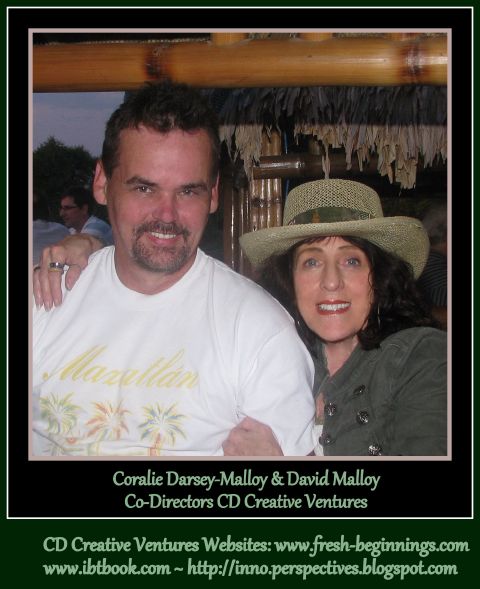
CD Creative Ventures is the hub of our personal and professional interests and adventures. It is the umbrella that interconnects information and links to our personal development company Fresh Beginnings, (www.fresh-beginnings.com Coralie's book I've Been There...A Testimony of Hope (www.ibtbook.com) and our free lance writing, self-publishing presentations for Balanced, Innovative Perspectives: http://inno-perspectives.blogspot.ca/
Wednesday, 1 February 2012
A Growing Social Problem: The Lack of Resources for Men in Need
By Coralie Darsey-Malloy and David Malloy
If we are to achieve a richer culture, rich in contrasting values, we must recognize the whole gamut of human potentialities, and so weave a less arbitrary social fabric, one in which each diverse human gift will find a fitting place.
--Michel De Montaigne
Medical and non-medical mental health resources report that men on the ‘edge of brokenness’ do not access support systems for a variety of reasons. A document released in September of 2004 (Patterns of Regional Mental Health Illness Disorder Diagnoses and service Use in Manitoba: A Population Based Study) revealed men commit suicide more than three times as often (two per 10,000) to females (0.6 per 10,000).The ratio is approximately 102 men to every 22 women.
The study does not reveal why more men commit suicide only that they do. According to Constance Eagle from the Anxiety Disorder Association of Manitoba women may attempt suicide but men carry it through…and in more violent ways. Although the reasons behind higher suicides rates in men are unclear, professionals theorize it is their unwillingness or inability to access mental health services that puts them at higher risk. Barriers such as peer pressure and gender socialization can make it difficult for men to open up to their wives, partners, family members and even their churches. The harsh and often shocking reality of their situation only hits when men run away from home or take their own lives. Men’s tendency to internalize feelings may lead to addictions, financial problems, violence, spousal and family abuse. When this occurs, fear of being forced into the justice system may prevent them from accessing mental health resources and see suicide as the only way out.
While researching this topic a media contact added her experiences. She published an article on depression. Afterwards, numerous men from her readership called and admitted to living in quiet desperation with nowhere to turn. RCMP records for Manitoba confirm that growing numbers of men are struggling in similar despair. There are 105 missing Manitobans and 95 of them are male and known to have health and psychological problems. On a larger scale, FBI databases in the United States contain the names of approximately 8,000 missing adults within the last year. Statistically most of them are men who are known to be struggling with a variety of personal problems.
While interviewing mental health professionals they raised concern that Canada is one of the few countries that does not have a standardized mental health policy. In Manitoba there is up to a six month waiting period for those seeking psychiatric help unless patients are a considered a danger to themselves or others. Coupled with the stigma associated with mental health issues it is not surprising tmen are reluctant to access existing services. One individual who left home in the midst of his crisis summarized the broader male perspective in this way,”When faced with challenging situations men don’t think to look in the yellow pages. It is hard for us to disclose what we think and feel at the best of times. Men rarely ask peers what they did (or do) because most of them don’t know where to turn either.
He added, “In conversations with other males I found there is a general view that it would be easier to seek help if Manitoba had a centralized intake process with a 24 hour crises line strictly geared to men and their personal challenges. Comfort levels would increase if it was understood that on-line counselors would respect confidentiality and had sensitivity to men’s issues and it was more widely advertised. Women inform women about what is out there whereas men do not. Because we don’t know and are afraid to admit things to ourselves or our peer. Things often remain the same until they become intolerable…then we act and often in ways that are not in our best interest.” Men caught up in domestic violence are often the victims of abuse themselves but they do not want to come forward, seek help or even tell anyone because of the same they feel about being hit or abused by women. The same is true if they have been or are being sexually abused at any age. Men have been indoctrinated into believing they have to be strong even when they feel vulnerable.
He and other interviewees felt that Manitoba needs a toll-free crisis line run ‘for men by men.’ From the feedback I received men are apprehensive about their health and well-being but resist going to doctors, healers or therapists because of their up-bringing or conditioning. Some of their health related concerns include; high blood pressure, heart disease, impotence, memory loss and prostate cancer. They admitted that self-esteem can be affected by their work, marriage, divorce, weight, appearance, retirement and financial security.
When these affairs become more than they can handle some men leave home as a coping mechanism. Sometimes they are forced to return to untenable situations before they are equipped to do so…because there is no other place for them to go. Men who have gone through this process say they did not have a sense of equality within our social system. One man put it this way, “When men do cave, leave home and contact family housing and services…some workers don’t know what to do with him. For example, a friend of mine ended out on the street for two days before making it to the Salvation Army.
He said one worker told him to ‘get his act together and go back to his family where he belonged.’ So he did. His circumstances didn’t change and he ended up killing himself two months later. Comparatively, when women are in crisis/danger existing safety nets kick and provide housing, direction and a sense of support. Men understand that women’s socialization is geared towards ‘sharing and caring’ within a co-operative network and that is the accepted norm. However, men who commented on this topic said they are completely lost when it comes to taking a proactive approach to resolving their problems. They view themselves and each other as pragmatic, problem solvers and have a low comfort level when life’s circumstances overwhelm them and alter their ability to cope in a ‘manly’ way…whatever that is.”
Another man I interviewed summarized it for the rest. “I believe men do not want to contact whatever resources are out there because of a genuine concern about being put when feeling weak or vulnerable.” He continued with a face washed in emotion, “Most women I’ve talked to keep towing the party line and say men need to take anger management classes and maybe we do. However, what they do not understand is that our anger is outer expression of other deeper feelings that we don’t know how to handle. Anger is the one emotion men are familiar with. Males display that in the sports arena and the crowds cheer. But how many men, women or children are equipped to handle a sobbing male who is overwhelmed with life? From childhood men are told to suck it up…and be men...so we soldier on and often make bad choices.
Unfortunately most men I know have never been shown another way to do it…so we stay in our comfort zones of familiarity and when that doesn’t work…we end it. Men thrive if they have a project to manage, re-build or construct...that we can do. But ask us to organize a system that would support our physical, emotional, psychological and spiritual well-being and we’re lost. That is why many modern men are floundering or leaving the life they had in whatever form they do it. “
When we read this while putting the content for this article together it was a full circle moment. Our initial media contact was on to something. This is definitely a social situation that needs more attention.
Excerpt from What Your Mother Couldn't Tell You & Your Father Didn't Know by John Gray
P. 56, 1994, Harper Collins 427 pages,
Silently Sitting on a Rock
It's crucial to remember that one of the most significant differences between men and women is that while women cope with stress through sharing in nurturing relationships, men cope through solving problems. Traditionally, men have dealt with their problems by silently and patiently thinking up solutions. Ancient hunters would sit on a rock and silently search the horizon, looking and listening for their prey, or looking across the plains at their target, studying its movements and planning the attack.
This process of sitting, waiting, scheming, and planning allowed him to relax and conserve energy for the inevitable chase. Focusing kept his mind off the fear of being attacked or of missing his target, and when he achieved his goal he returned home a happy, stress-free man.
Why Men Watch TV
When a modern man comes home, quite commonly he sits in his favourite chair and either reads the newspaper or watches TV. Like the ancient hunter who needed to recover from the stress of his day, he instinctively finds his rock to sit on and begins gazing off into the horizon. Through reading or listening to the news he is, in effect, looking out over the world or scanning the horizon. As he picks up the remote control and begins searching through the stations, or turns the pages of his paper, he is once more in control: he silently and swiftly continues his hunt.
As he assumes this ancient posture, deep and reassuring feelings of security begin to emerge. Feeling in control, he is able to most effectively cope with the stress of not having immediate solutions to the problems of his life.
Through this instinctive ritual, he is able to temporarily forget his problems at work and is eventually ready for the relationship.
In our counseling work it is clear that society needs to create more resources for men and change the stereotype about what it actually means "to be a man" at this stage of human development. Just as women and their roles in society have changed the same is true for men. There needs to be a collaborative effort to support both genders through this difficult and challenging times.
Subscribe to:
Post Comments (Atom)







No comments:
Post a Comment